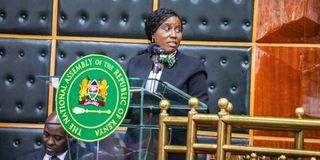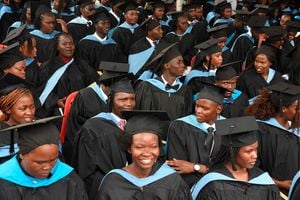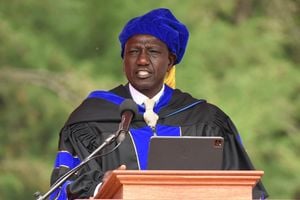
Principal Secretary, State Department for Higher Education and Research Dr Beatrice Inyangala responding to questions from MPs at Parliament buildings on Tuesday, August 20, 2024, on new higher Education Funding Model.
The journey towards free education in the country may have started in earnest yesterday after MPs told the Executive to develop a policy to guide the amalgamation of all kitties to fund education.
At a Speaker’s Kamukunji (informal session) yesterday chaired by National Assembly Speaker Moses Wetang’ula, the MPs were resolute that having so many education kitties to offer bursaries to needy students is prone to inefficiencies and corruption.
The MPs also singled out the Higher Education Department led by Principal Secretary Beatrice Inyangala for poor communication on the new funding model, which they said was marred by discrimination against poor students. The MPs accused the PS of leaving it to the President to communicate the suitability of the new model.
Mr Wetang’ula said that the current situation where MPs, members of the county assemblies (MCAs), Woman Reps, University Fund (UF), Higher Education Loans Board (Helb) and Ministry of Education have bursary kitties may not be wise.
“If you can generate a policy to amalgamate these funds, this House will be more than willing to turn it into a law so that we get a university education that is free,” said Mr Wetang’ula. “Our problems will be solved overnight.” He said this following a proposal by Changamwe MP Omar Mwinyi who had called for the consolidation of all the government funds that finance bursaries.
Already, the Education ministry has drafted a Bill to consolidate bursaries and scholarships into one fund. And last week, Nairobi Woman Rep Esther Passaris gave notice of motion on comprehensive bursary reform in the country which heavily borrows from the Basic Scholarships and Bursaries Bill, 2024. It seeks to consolidate all government scholarships and bursaries and put them under the ministry, de-linking them from politicians.
The Presidential Working Party on Education Reforms also recommended that Helb, UF and Kenya Universities and Colleges Central Placement Service be collapsed into one body to finance higher education.
The MPs also accused the vice-chancellors of universities of frustrating learning by constantly sending students without fees back home. This was however with the exception of the University of Nairobi which the MPs said does not turn away students for non-payment of fees.
“We have said that there is no student who will be turned away because they have not paid the household component. We have communicated to the VCs in all the universities that they should not be turning away students,” said Prof Daniel Mugendi, the chair of the VCs’ lobby. He clarified that “accommodation is different because it is provided by private entities”.
The MPs told the PS to find ways of having part of the money given to students for their accommodation and other needs paid to the owners of hostels.
The new higher education funding model uses a means testing instrument (MTI) to determine how much the government can chip in to finance education in universities and as technical and vocational education and training institutions.
The MTI has been employed on the basis of the student’s family income. Families with a monthly income of up to Sh5,995 are placed in band 1 with those with income of up to Sh23,670 in band 2. Those with income of up to Sh70,000 are in band 3, up to Sh120,000 in band 4 and those with income above Sh120,000 in band 5. The high schools the learners attended are also among the variables under the MTI.
But the MPs demonstrated how it was flawed as many students who attended national schools were placed in bands 4 and 5 despite their education having been financed through bursaries.
“This MTI thing is unworkable because some students feel ashamed sharing information that they think is in their personal space, which makes them end up being placed in the wrong band,” said Githunguri MP Gathoni Wamuchomba.
Dr Inyangala said that the government has placed desks at the universities where students who have been placed in the wrong bands can appeal to be placed in the correct bands.
The PS also raised doubts about the accuracy of the data provided, noting that 70 per cent of the students declared their family income to be less than Sh5,000 and over 80 per cent to be children of single mothers.
Suba North MP Millie Odhiambo noted: “The issue of the school someone attended being used to gauge their poverty levels is very misleading.” Kilifi North MP Owen Baya said “you are poor until you are declared otherwise because we all live in Kenya”.












